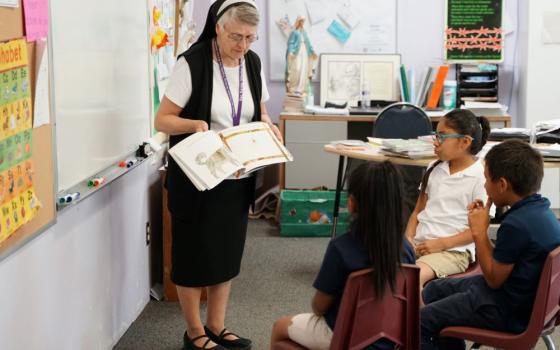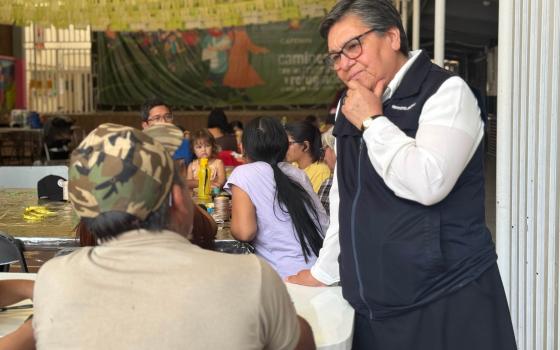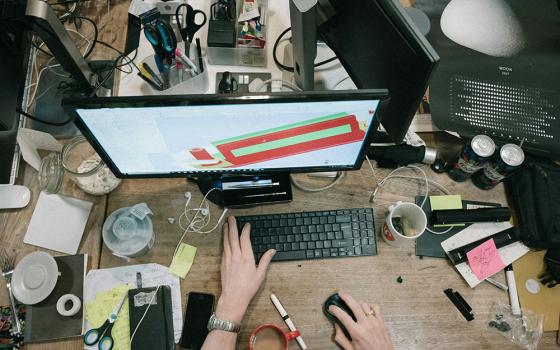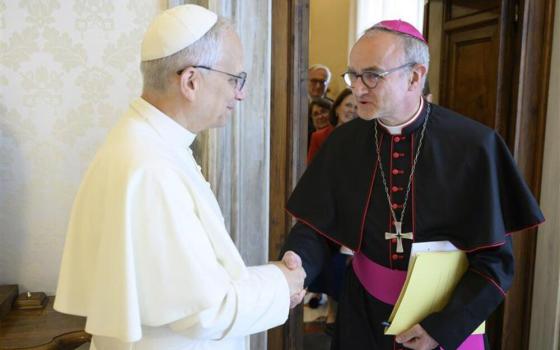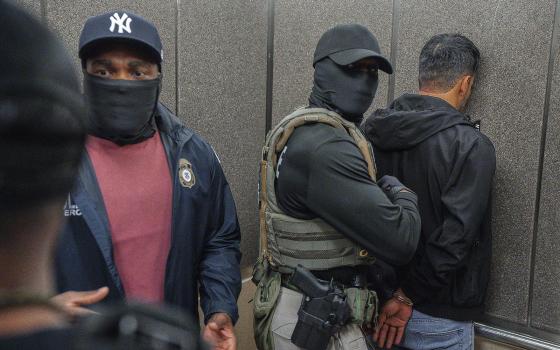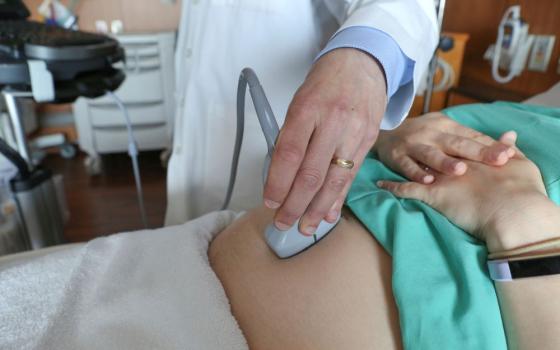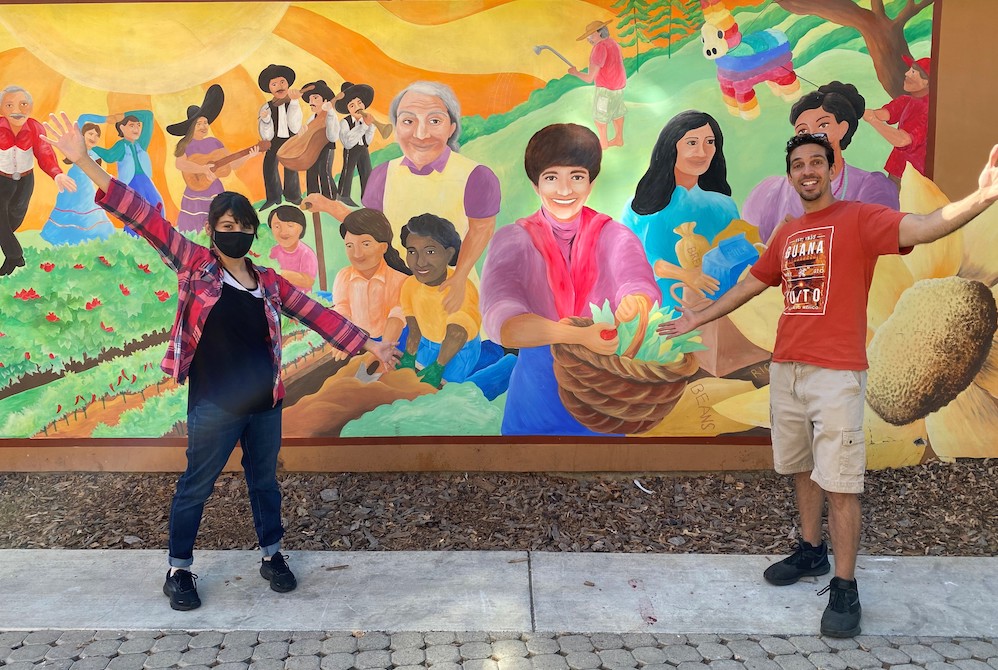
Jennifer Castro-Lara, left, and Samuel McCoy pose in October by a mural at the St. Francis Center in Redwood City, California, where they helped with food distribution as part of their Notre Dame Mission Volunteers-AmeriCorps duties. Castro-Lara served last year at Sequoia High School in Redwood City and this is at the St. Francis Center, which assists working poor families with food, clothing and other needs. McCoy serves at Sequoia High School this year. Both are meeting the challenges posed by the coronavirus, serving as listeners to students as well as tutors. (Provided photo)
Just weeks into the shutdown required by the COVID-19 pandemic in March, Lizzie Royster figured out how to continue to serve the 120 clients at the Su Casa Hispanic Center in Cincinnati, Ohio: She adapted Google Meet, which the center's team already used to stay connected, to create online classes.
"Our education team turned almost into an IT team," said Royster, 23, who tutors the center's clients in English and coordinates other volunteers as a Notre Dame Mission Volunteers-AmeriCorps member. "I've had to be the most creative I've ever been."
Royster had to figure out which instructors could volunteer, which clients had phones and computers that could access Google Meet, and how to adjust in-person classes to a virtual environment. But thanks to her flexibility, 45 of the clients were able to resume their classes through the summer; the center held a virtual summer camp for elementary school children; and 78 adult education clients can now take English-language virtual classes.
Tapping creativity and ingenuity is a hallmark of the Notre Dame Mission Volunteers-AmeriCorps program members who found their terms of service disrupted by the COVID-19 pandemic or who are starting their stint with coronavirus restrictions still in place.
The Sisters of Notre Dame de Namur began partnering its volunteer program with AmeriCorps, a network of U.S. service programs, in 1995. Notre Dame Mission Volunteers-AmeriCorps members, who are usually in their 20s, spend 11 months serving in a variety of individual and small-group teaching, tutoring and other programs. They receive a stipend for living allowances and help with student loans through AmeriCorps.
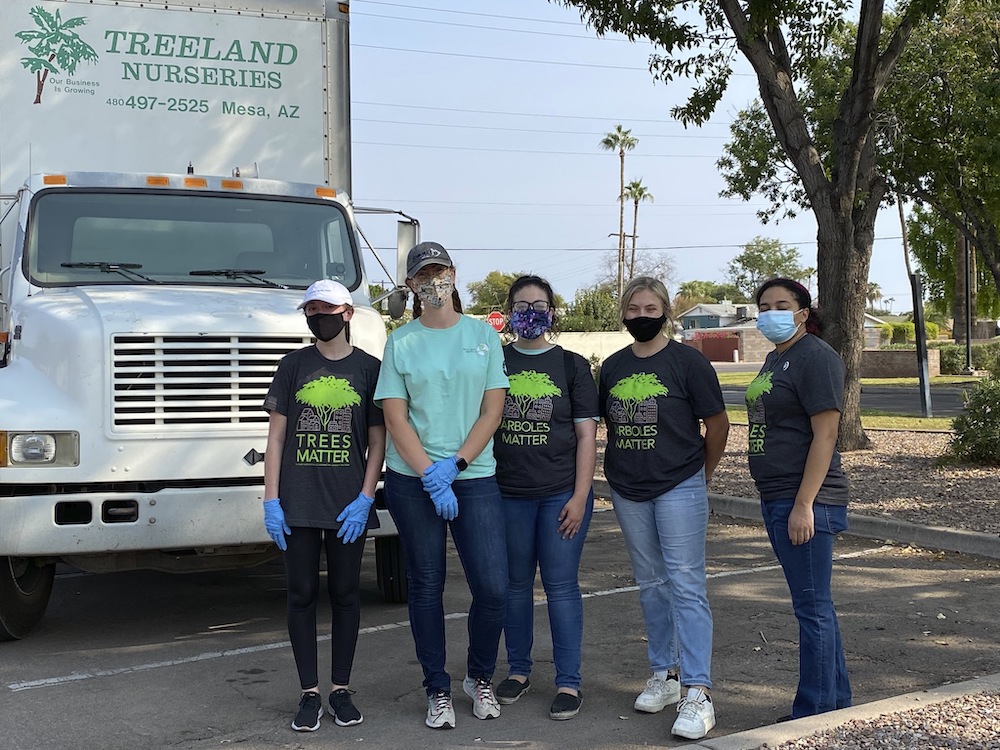
From left: Nicole Chasey, Kirsten Frey, Lurissa Carbajal, Kenna Gottschalk and Rachelle Crespo, Notre Dame Mission Volunteer-AmeriCorps members in Phoenix, volunteer Oct. 17 with Trees Matter, which distributes shade trees and conducts classes on caring for native trees. While most Notre Dame Mission Volunteer-AmeriCorps work is education-related, members sometimes volunteer outside of education. (Provided photo)
With the program having more than 400 volunteers and 220 schools and community centers sites around the country, the pandemic required "a massive shift," said Adrienne Andrews, the program's executive director, with a "volume of people to move around."
"Every location around the country was doing something different, so for us, it was trying to handle a lot of different moving parts at the same time," she added.
Most members stayed in the cities where they were serving, and those already from those areas served remotely, Andrews said. Many adapted to virtual teaching-learning methods, delivered meals to children usually on free or reduced-price lunch programs at school, or helped senior citizens. A member in Watsonville, California, called 60 senior citizens who were living alone weekly to check in and help identify gaps in what they needed in terms of medication or food. She then worked with local service organizations to support their needs.
The focus was to keep as many members as possible engaged and serving where and how they could, Andrews said. The program kept 380 of its volunteers through the end of their term of service in July, and about 30% of those volunteered for another service year, which began in September. Funding is available for up to 500 positions, and applications will be accepted for the 2020-21 term through January, she added.
The program has also had to accommodate its partnership sites, many of which involve small nonprofits, by helping to look for alternate financing for those that no longer could afford the required funding contribution.
"Our staff has been super positive and creative and constructive," Andrews said. "Whenever they've had a member who fell off the radar or a school that says, 'We can't partner,' people just find a creative way to make it work."
Advertisement
Adapting to a new normal
The program's creativity surfaced early in the pandemic, as members — organized by geographic sites — regrouped in their teams online. Online training and enrichment sessions were held each week for members with the national office. Notre Dame de Namur sisters shared stories about their international ministries and experiences. Volunteers learned how to do art lessons via Zoom and even participated in virtual yoga classes.
Site directors kept their local teams connected through a variety of skill-building and just-for-fun virtual meetings. In Cincinnati, for instance, online sessions included pizza-baking, workouts and games, said site director Nancy Groszek. Now, breakout rooms are used every other Friday for discussions on books, podcasts and reflection questions.
In San Francisco, one team member sent the others a recipe and some of the ingredients for a chocolate cake, and team members baked the cake together during an online session.
"In the beginning, it was hard, but members were into leading the meetings," said Hana Thompson, the site director for the San Francisco area. "It was a glimpse into their personal lives. We got to see others' homes and peek at how they move about their regular days."
Connecting with sisters remains key to the Notre Dame Mission Volunteers program, and the shift to virtual meetings actually allowed sisters to participate more broadly. Sisters are engaging with team members more often and in different sites, such as in Boulder, Colorado, where there is a large number of team members but no sisters nearby. Now, sisters are connecting with team members there via Zoom to be part of the training about the history and legacy of the Sisters of Notre Dame de Namur.
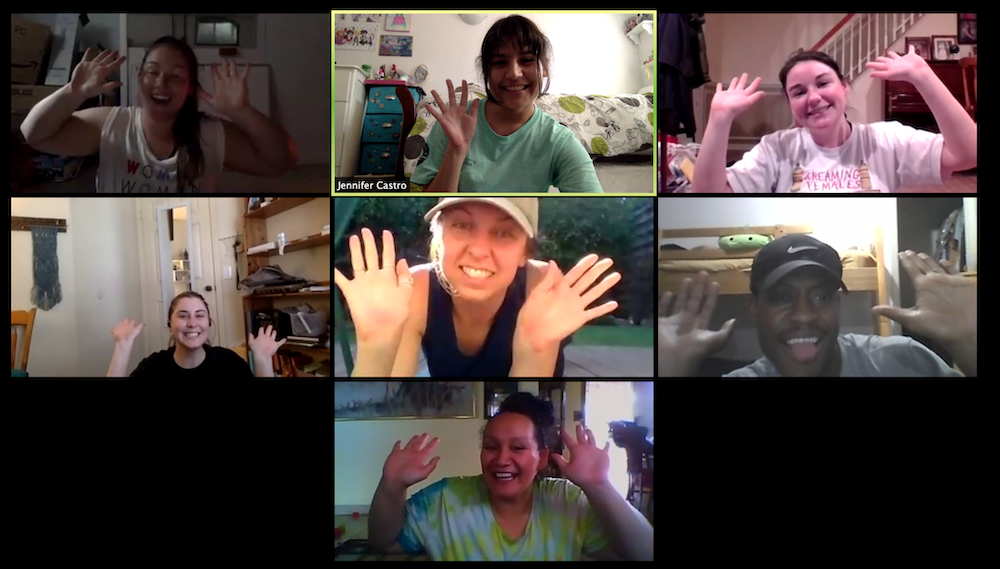
Notre Dame Mission Volunteers-AmeriCorps site directors and members take a Zoom stretch class led by Natalie Reina, center, site director in Los Angeles, as part of a national member engagement project during the first months of quarantine. Pictured, top row, from left, Meg Clymer, site director in Boulder, Colorado; Jennifer Castro-Lara, volunteer in San Francisco; Monica de Los Reyes, volunteer in San Francisco; middle row: Danielle Geving, volunteer in Los Angeles; Reina; RG Shalom Fleuridor, volunteer in Apopka, Florida; bottom: Hana Thompson, site director in San Francisco (Provided photo)
Up to 30 sisters take turns volunteering to be part of virtual training sessions, Andrews said. One sister participated in four different orientations in September alone.
There had been plans for the Cincinnati team to start holding meetings at the congregation's Cincinnati province center in 2020, increasing the connection with the sisters from the usual twice-a-year gatherings. But when coronavirus restrictions made that impossible, one sister coordinated with a group of other sisters to instead rotate into the team's Zoom meetings regularly, said Sr. Kathleen Harmon, provincial moderator of the Ohio unit of the congregation.
"We're going forward as best we can to build those relationships" until they can meet in person on the province's campus, she said. "That was part of our vision of community: to have the sense of being connected with the volunteers."
Members often look to the sisters for affirmation of their choice to serve others, a decision not always understood by family members or peers, she said. Yet the members are also "at the core of what we do as the Notre Dame de Namur mission: expressing the goodness of God and showing in concrete ways how we're changing of lives of others," Harmon added.
At one recent virtual session, Groszek said, Sr. Judy Tensing spoke to the members in Cincinnati and Dayton about the Notre Dame hallmarks: the essential characteristics, values and activities of the Notre Dame sisters and their learning communities.
"Our members come from a wide range of beliefs and backgrounds," Groszek said. "So we ask: What does your life proclaim? What do people learn about you from your core beliefs? When things get tough, it's your core beliefs that will get you through."
That's a key message Tensing said she tries to convey to team members during this difficult time. She said she has been particularly impressed with how this cohort of volunteers is adapting to the current challenges.
"It's amazing that they want to do the Notre Dame Mission Volunteers-AmeriCorps," she said. "It's calling us [as sisters] to have the members be aware of what the hallmarks of the Sisters of Notre Dame are. It's not just doing a service project. It's sharing in what has inspired the Sisters of Notre Dame through the years and seeing there's a chance to help people. This is above all that is going on."
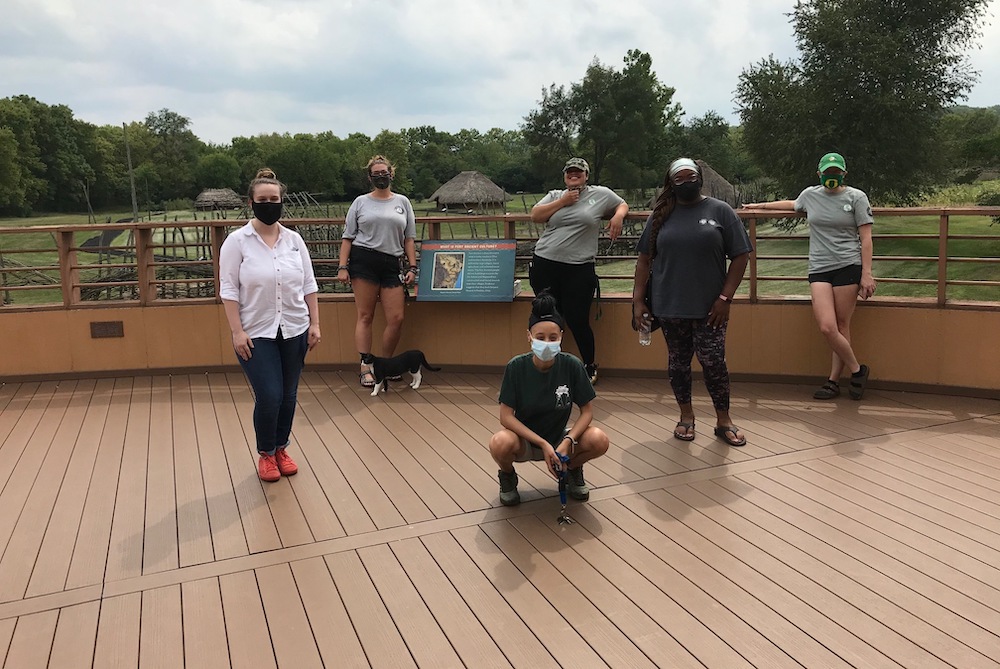
From left, Kenzie Guthrie, Hallie Hayden, Kevyn Lawson, Ronnie Murphy, Ulicia Woods and Meagan Yelenich, the Notre Dame Mission Volunteers-AmeriCorps' Dayton, Ohio, team, pose at Sunwatch Indian Village/Archaeological Park during their first day of orientation Sept. 1. Part of the day's activity was learning about the history of Native Americans in Dayton. (Provided photo)
'What I can do is transmit calm'
How the members serve students, adult-education clients and other program recipients has required the biggest changes in the pandemic. Flexibility and a willingness to try things that are completely new seem to be common denominators.
The third-, fourth- and fifth-grade classrooms in which Sam Peters serves at Corryville Catholic Elementary School in Cincinnati are using a blended model of in-person, online and virtual instruction.
"It's all new for me, but it's new for the teachers as well," she said. "My role is to take off their plate what I can, to be another adult that they can lean on."
She usually helps monitor the in-person students in those three grades but has found herself substituting in first grade, kindergarten and preschool classes if other aides are out.
While some team members may not have been able to continue tutoring or other services because of the pandemic, "there was no hesitation in saying, 'I couldn't work where I was supposed to. What can I do instead?' " Harmon said.
For example, when schools shuttered in the spring, many students didn't have access to meals they normally get. So the members stepped up.
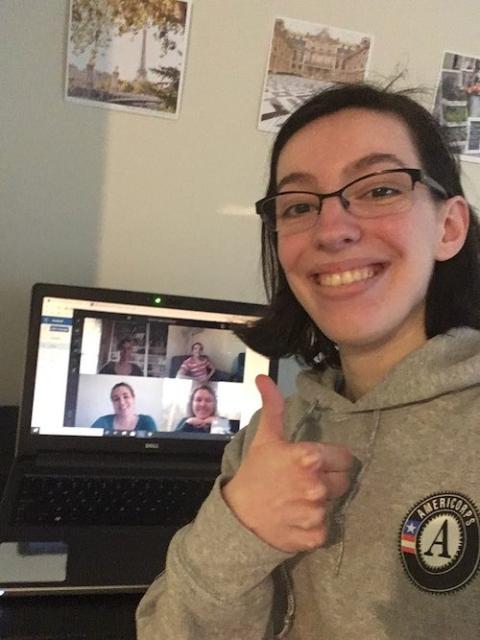
Elena Tothazan, a second-year member in Atlanta who provides adult education at the International Rescue Committee, plans with her adult education team for virtual adult English classes. Tothazan had just two weeks in the spring to adapt her cultural orientation program to a virtual format. (Provided photo)
"They figured out ways to get food and get it distributed," she said.
In Atlanta, team member Hattie O'Hara oversees volunteers who bag food twice weekly for families of students enrolled at the Global Village Project, a nonprofit school for recently arrived refugee girls. In addition to meeting a need for the families, the food distribution continues to engage the school volunteers, often retirees who normally would be assisting in classes, she said.
"I'm really having to stretch myself in engaging volunteers," she said.
One of her biggest challenges is building relationships with the refugee girls over Zoom. The girls aren't required to turn their cameras on, "so it can feel like I'm not forming a relationship with a girl, but with a black box with her name on it," she said.
But in sessions such as study halls, the girls tend to turn cameras on, and she said she has had more casual conversations and learned more about them.
Samuel McCoy, who serves at Sequoia High School in Redwood City, California, sees his role as not just being a tutor, "but to also be a caring adult in their lives and listen to them." He tries not to talk about grades right away with his students, but checks in how they are doing, sharing ways to stay healthy amid the realities of the pandemic.
"Some students are having a really tough time," he said. "What I can do is transmit calm."
A convert to Catholicism, McCoy was attracted to Notre Dame Mission Volunteers-AmeriCorps after stints with AmeriCorps and the Peace Corps because of his faith and inclination toward service as well as the appeal of the program's structure.
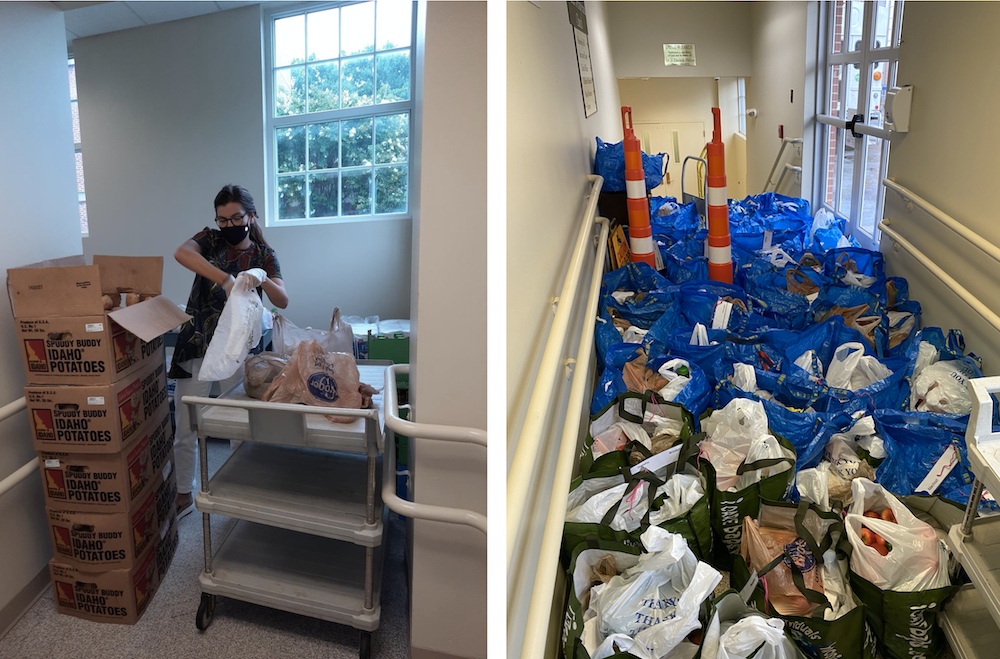
At Global Village Project in Decatur, Georgia, Notre Dame Mission Volunteers-AmeriCorps members help pack 39 bags of food each Tuesday and Friday for families of the school's students during the pandemic. The bus that delivers the bags of food normally would be used to transport students and also is used to drop off academic materials like homework and books to students. (Provided photo)
"I like being in a community and feeling like I'm on a team," he said.
The pandemic is also creating new opportunities for the program itself.
In Boston, members will serve at 11 learning pods in a partnership with Neighborhood Villages, a nonprofit focused on improving access to child care and early education. Members will work as aides in early childhood centers and as tutors for school-age children after school. Parents of kindergarteners through eighth-grade students who can't be with their children at home can drop them off at a pod for a safe environment with reliable technology.
"We have a few other cities in mind where this could work," Andrews said. "We have to get the model right and then launch elsewhere."
Some traditional aspects of the program also have to be altered. The midyear gathering that brings together all team members and site directors for a three-day meeting in February for sharing and skills sessions is being adjusted to a virtual format.
Meanwhile, team sites are partnering with each other to build connections.
"Folks are creative," Andrews said. "People just recognize this is what's in front of us. This is what we have to work with. What can we do with this?"
"The measuring stick right now can't be pre-COVID," she said. "We're re-visioning what that measuring stick for success is."
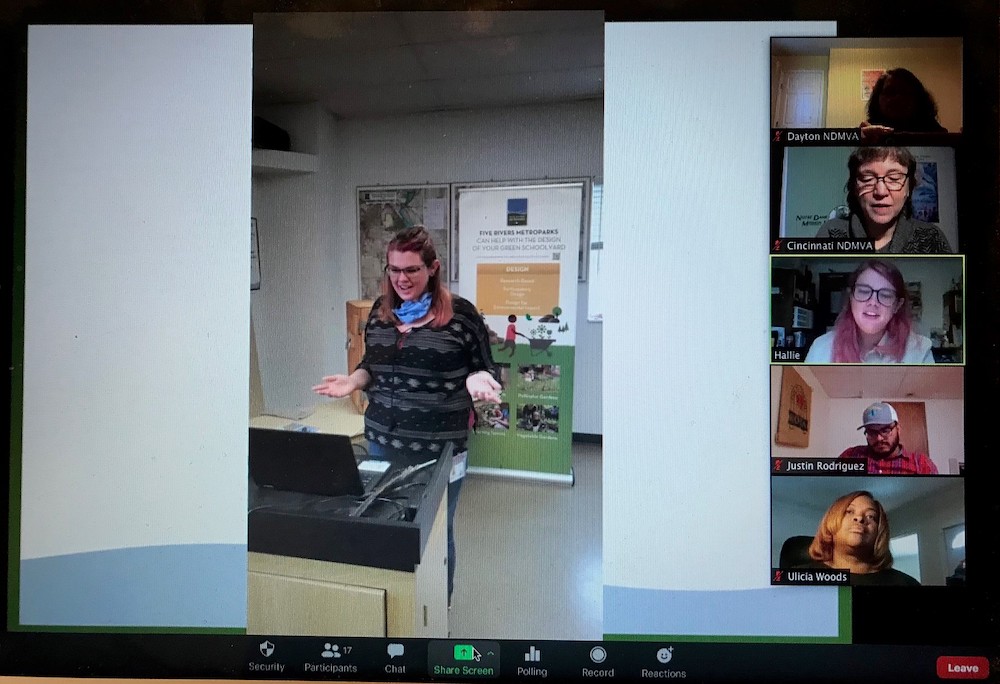
Notre Dame Mission Volunteers-AmeriCorps members Hallie Hayden, center, discusses her role as a naturalist assistant and green schoolyards assistant with other team members through a Zoom call, one of the ways members stay in touch in the pandemic. Hayden helps schools install gardens in Germantown, Ohio, about 45 miles from Cincinnati. (Provided photo)
[Gail DeGeorge is editor of Global Sisters Report. Her email address is gdegeorge@ncronline.org. Follow her on Twitter: @GailDeGeorge.]

